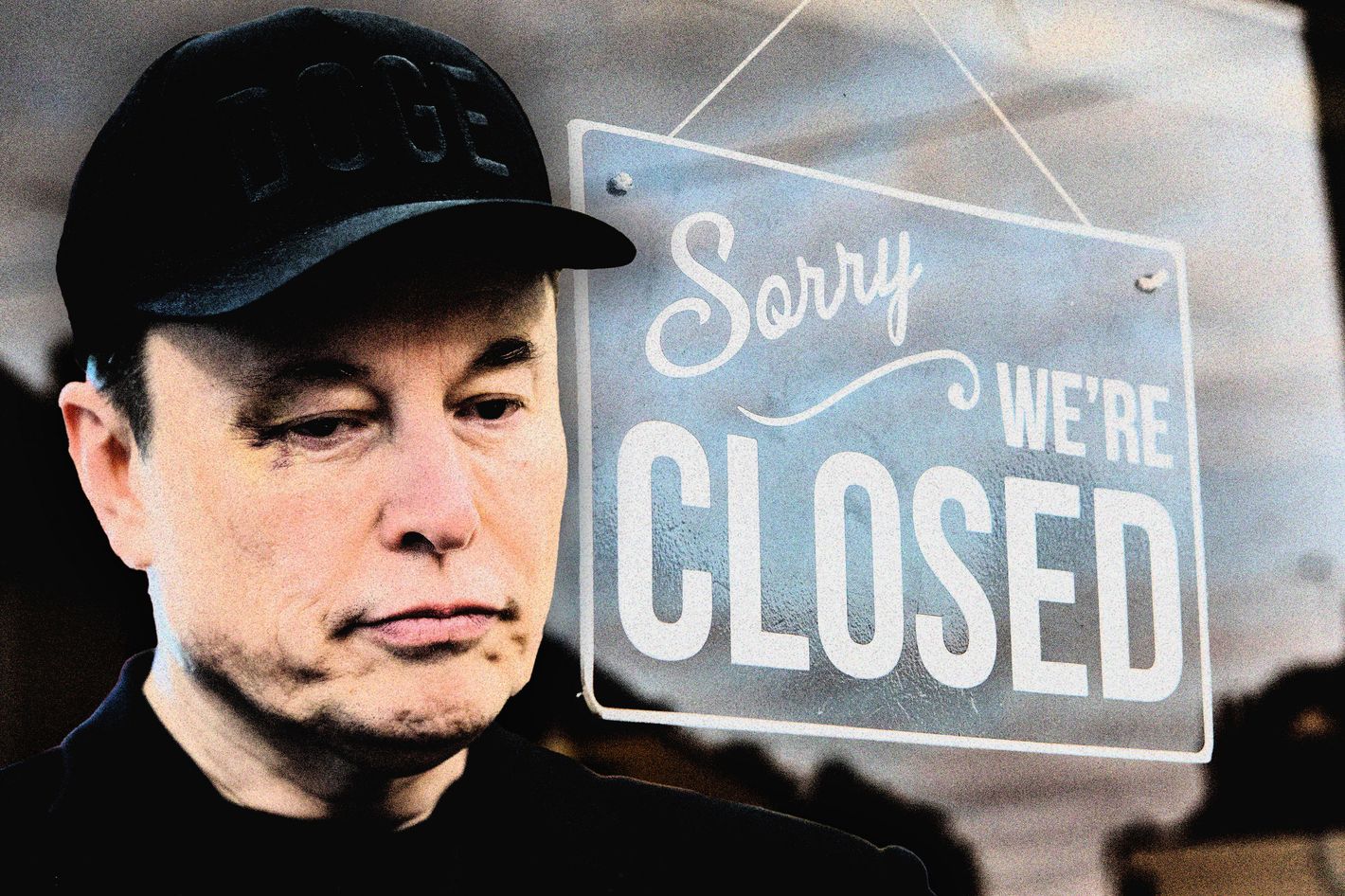
Photo-Illustration: Intelligencer; Photos: Getty Images
There is arguably nothing that better illustrates the chaotic and borderline-nihilistic nature of Donald Trump’s presidency — particularly during his wild second term — than the brief reign of terror carried out by the Department of Government Efficiency. DOGE has now been officially put out of existence about halfway through the 18-month lease on life it was given by a Trump executive order, but long after it ceased to function as a significant presence in Washington, D.C. It was a disaster, then a zombie, and now it’s dead.
Though pro-Trump media tried to retroactively justify the out-of-nowhere department (grafted onto a minor federal IT office left over from the Obama administration) as a reflection of extremely vague Trump ’24 promises to reduce the size and cost of the federal government, it began and very much remained a vanity project of his biggest campaign donor, Elon Musk. That Musk was also a huge federal contractor (his only real experience with the federal government he decided to turn upside down) and the richest man in the world wasn’t a problem for the president who owed him so much.
Musk and DOGE conducted a brief ramp-up before Trump’s second Inauguration, but then hit the ground — and the federal bureaucracy — with incredible sound and fury. It’s hard to convey to anyone who somehow missed it all how terrifying it all was, not simply to the federal employees he very deliberately terrorized, but to anyone with a positive view of what government could accomplish. As my colleague John Herrman explained back in February, the great genius Musk was mindlessly destructive:
Specifically, he wants to fire as many people as possible. Punishing workers is a cause and a purpose unto itself, inseparable from a grandiose conflation of personal desires and successes with the fate of humanity. It’s an ecstatic project with an accelerationist character. “I am become meme,” he declares, as his team of private-sector loyalists harasses federal employees with spiteful emails threatening to get rid of them. The message from the largest employer in the country to its disfavored employees could not be much clearer: You are waste, you are fraud. We want to make a spectacle of your misfortune. We cannot wait to fire you.
It was typical of DOGE’s tactics that one of its big cost-cutting measures was to slow down or stop the payment of invoices on existing contracts signed by various federal agencies. Musk and company literally told Uncle Sam not to pay his bills and called that “efficiency.” And throughout the federal government, for weeks and months very little work was done because the employees who hadn’t been laid off were busy justifying their existence to Musk’s kiddie corps of coders or scrubbing websites to eliminate language these neophytes considered MAGA-unfriendly. On the evil-stupid spectrum of bad undertakings, DOGE uniquely held down both ends, and federal courts, and eventually Trump’s own Cabinet, began to object to the whole enterprise.
And then, as suddenly as Musk had arrived on the scene in Washington, he was gone. In May he allowed as how he needed to go spend more time with his private companies. By early June he had noisily broken with Trump on multiple issues, publicly spitting disdain for the One Big Beautiful Bill and throwing MAGA devotees of both men into turmoil. Only now are personal accounts emerging of how the Trump-Musk feud created a panic among DOGE staffers who realized they were no longer protected by Musk, and might even be exposed to personal legal liability for their reckless misconduct.
As DOGE rapidly retreated from the center of life in Washington, some Musk protégés left government altogether while others burrowed into the leadership of the agencies they had been terrorizing, or hung on at DOGE’s original beachheads in the General Services Administration and the Office of Personnel Management. The ideological task of intimidating federal employees and decimating non-MAGA programs and policies was shifted to Russell Vought’s Office of Management and Budget. OMB is a familiar instrument of imperial presidencies past and present but far less swashbuckling in its approach and somewhat more law-abiding. Meanwhile, DOGE’s own legacy seems to have crumbled even further as an initiative that likely cost more than it saved and mostly just made it hard for people to do their jobs. In some areas, such as DOGE’s inhumane decimation of foreign assistance to the poorest countries on earth, it represented the worst impulses of the MAGA movement. In others, it was just a waste of everyone’s time.
Perhaps DOGE alumni who shared the short-lived excitement of the agency’s initial raids on the “deep state” will go on to fruitful careers in one of Musk’s companies or even in the federal government. But they probably shouldn’t put DOGE on their CVs unless they plan careers in industries where pure destructive energy is an asset. It was a comprehensive failure that didn’t last long enough to interrupt careers other than among its victims.
More on Politics
Trump’s Latest Power Grab: Reviving the Rush Hour Movies?Lindsey Halligan Gets SunkTrump-Epstein Relationship Timeline: What the Files Reveal
From Intelligencer - Daily News, Politics, Business, and Tech via this RSS feed

